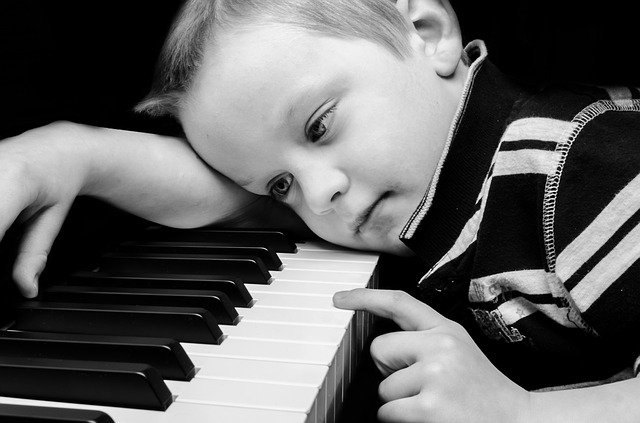
It is one of the most curious effects of music on emotions. Whenever you are feeling down, there seems to be a raft of tunes available to pull your mood back up again.
But why do sad songs have this effect?
And how does it work?
One of the first people to give an explanation of the “mood-lifting” effect was the psychologist William James. He noted that listening to sad music can make one’s mind dwell upon those feelings, indulging them rather than attempting to shake them off.
There are several ways in which this could potentially happen. The most straightforward way is that we simply wallow in those sad feelings.
We revel in them and embrace the feeling of sadness wholeheartedly, pacifying the need to feel upbeat by listening to music that allows us to “emotionally wallow” instead.
Yet this explanation is only one piece of the puzzle. Listening to sad songs has also been found to relate to our need for closure.
Think about a time when you were feeling really down.
Chances are, the blues lasted for more than a day or two. This is because negative moods tend to be sticky – they hang around far longer than positive moods.
It’s as if our minds are hard-wired to dwell on negative experiences for longer than on positive ones.
The psychology of sad music
This “stickiness” of negative moods seems to be a crucial aspect of what draws us to sad music.
In many cases, people who are feeling really low might actually welcome that extra length over which they can indulge in their despair. Sad songs give that necessary time for indulging those feelings – and this is something we find gratifying.
It also suggests that when people listen to these songs, they are actively trying to prolong their feelings of sadness in order to reap the benefits.
One study found that it wasn’t just the enjoyment of listening that was related to how much people wanted to prolong their negative feelings – the power of sad music also depended on how strongly listeners felt the need to ruminate over their sorrows.
The final explanation is that sad music makes us feel better by allowing us to form or strengthen our social bonds.
There are many examples of people sharing tearful, meaningful experiences with music – most often with one another. Some have suggested that this is because sad songs allow us to recall memories of those we have lost.
When listening to such music, memories of those who are now absent can be strongly felt once more – and this gives us a comforting feeling as it reaffirms our meaningful relationships.
Sad songs, therefore, allow us to wallow in those feelings for longer than we might usually, which can give rise to those pleasurable and exciting “chills” down the spine.
They give us a time and place for indulging those sad feelings, as well as giving us the opportunity to prolong those feelings longer than we would normally allow.
This gives rise to an intense experience that can be pleasurable and comforting – but only under certain circumstances: We should feel low in order to want to listen to sad music, and we should be in a safe and supportive environment.
Making sense of sadness

Sad music is not only about sad people finding solace in something that can relate to their sorrows.
It requires careful consideration of the social context, as well as our own mood state before these songs can have any effect.
So if you are feeling down and your friends want you to come round for a listening session, don’t be afraid to give it a go – who knows, you might just find yourself consoled by the experience.
However, bear in mind that sad music can have negative effects too.
Excessive exposure to songs that are already particularly melancholic could heighten one’s sense of sadness and loneliness.
Sadness is sometimes seen as being an “easy” emotion to express through music, and this makes it all too easy to produce sad songs.
But remember: Not everything produced in such a style is necessarily profound or artistic.
Sadder-than-usual songs may make us want to cry, but they can also make us feel good about ourselves afterward by reaffirming our feelings of social closeness or helping us prolong those negative emotions.
So if you are ever feeling down and want to give sad music a chance, I urge you to do so – just be wary of listening to it too often or outside of the right setting.
- Related post: How commitment phobia is weakening your friendships
- Related post: Is Minimalism Really a Practical and Effective Way to Be Happier
Is sad music good for you?
There is no definitive answer to this question, as the effects of sad music depend on a variety of individual factors.
However, what we know about the psychology of sadness suggests that there are some potential benefits to listening to sad music under certain circumstances.
Sad music can help us to wallow in our negative emotions for longer than we would normally allow, and this can give rise to an intense experience that is both pleasurable and comforting.
It can also help us to form or strengthen our social bonds. So if you are feeling low and your friends want you to come round for a listening session, don’t be afraid to give it a go. You might just find yourself consoled by the experience.
However, bear in mind that sad music can have negative effects too: Excessive exposure to songs that are particularly melancholic could heighten one’s sense of sadness and loneliness.
If you ever feel down and want to give sad music a chance, I urge you to do just that – but be wary of listening to it too often or outside of the right setting.
Conclusion
It is now clear that sad music has an effect on us. It can help us to prolong our negative emotions, and it can give rise to pleasurable feelings.
However, the effects of sad music depend on so many individual factors that we should be wary of generalizing these findings too much.
If you are ever feeling low and your friends suggest a listening session, I urge you to go ahead – who knows, you might just find yourself consoled and comforted by the experience.



